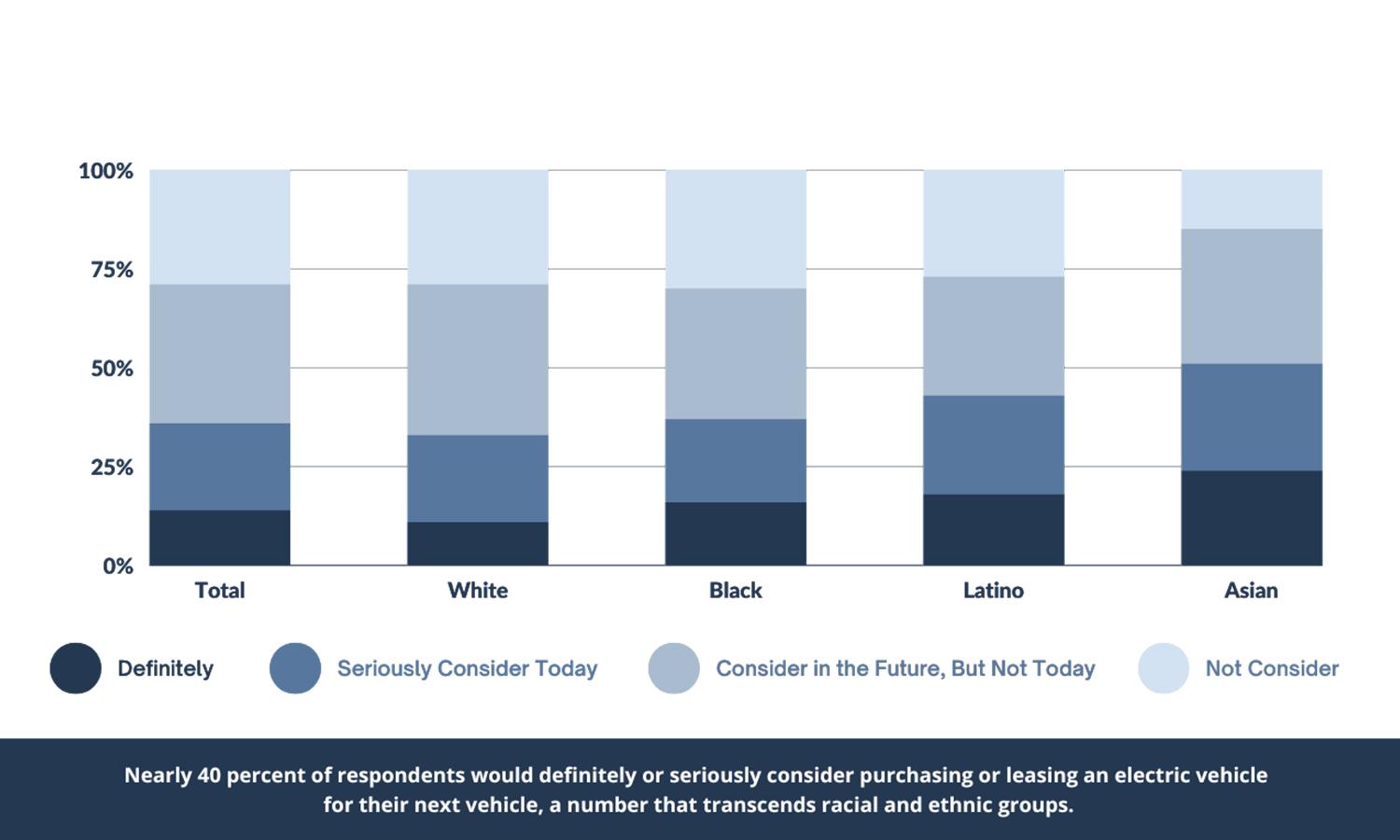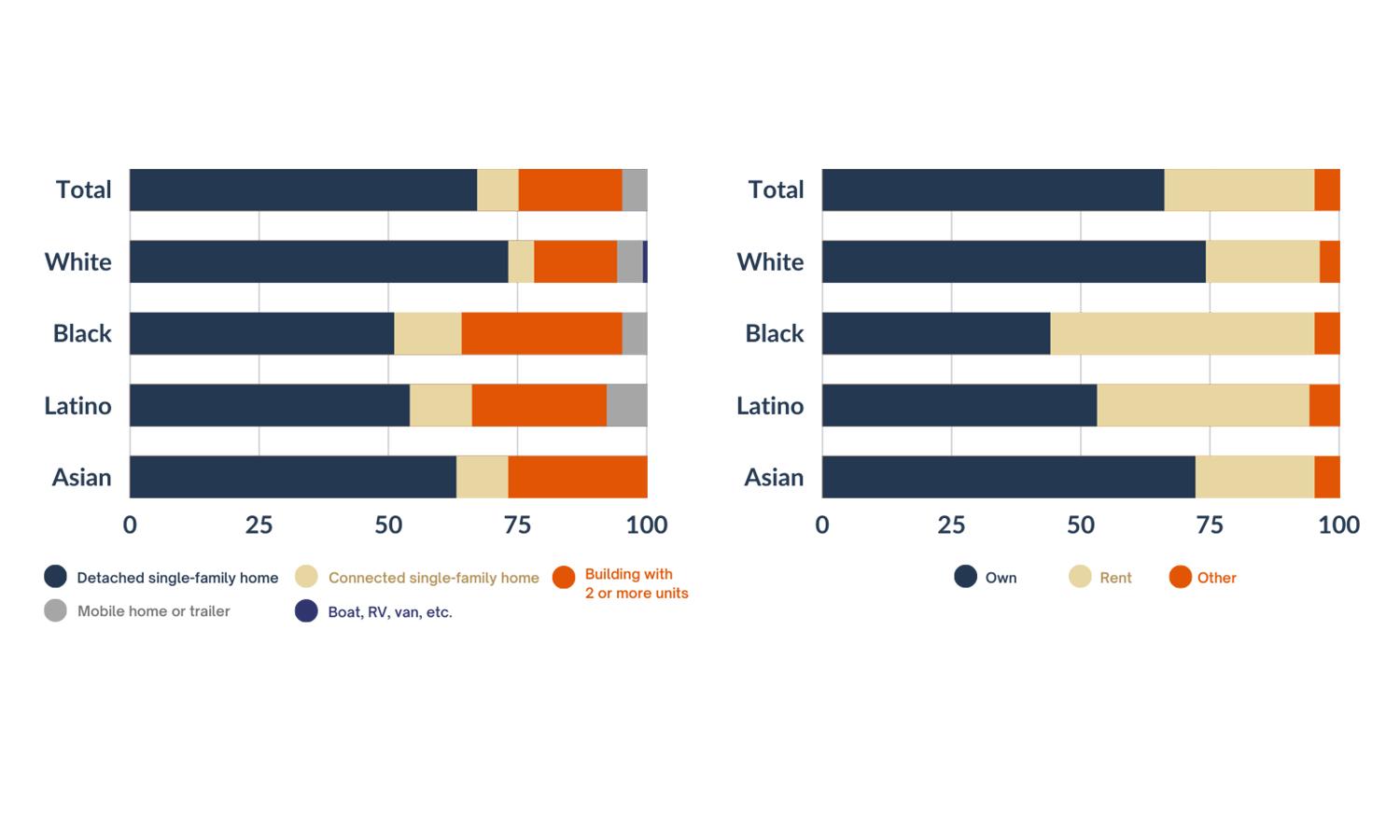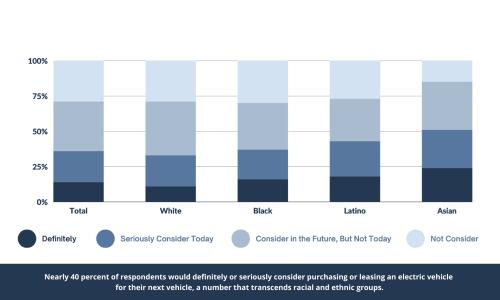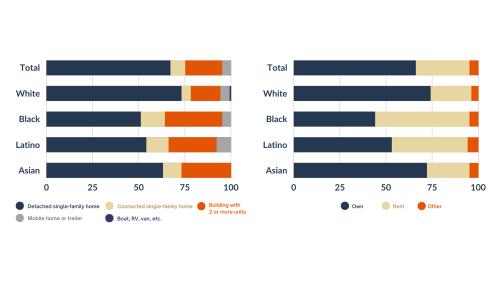Transportation is the largest source of global warming emissions in the United States, with light-duty passenger cars and trucks as the largest contributor.
These vehicles are a significant contributor to poor air quality, and pollution from on-road transportation disproportionately affects communities of color.
Electric vehicles (EVs) are a critical strategy to reduce transportation emissions, and yet the communities most harmed by the status quo currently adopt this key technology at disproportionately low rates.
A recent, nationally representative survey of 8,027 Americans conducted by Consumer Reports with input from the Union of Concerned Scientists, GreenLatinos, and EVNoire, fielded from January 27 to February 18, 2022, helps shed light on some of the reasons for this disparity, which can help policymakers move the country forward—toward a more equitable, accessible, and electric future
Survey Says: Considerable Interest in Electric Vehicles Across Racial, Ethnic Demographics
This is a condensed, online version of the report. For all figures, references, and the full text, please download the full report PDF.
Summary
Transportation is the largest source of global warming emissions in the United States, with light-duty passenger cars and trucks as the largest contributor. These vehicles are a significant contributor to poor air quality, and pollution from on-road transportation disproportionately affects communities of color.
Electric vehicles (EVs) are a critical strategy to reduce transportation emissions, and yet the communities most harmed by the status quo currently adopt this key technology at disproportionately low rates. A recent, nationally representative survey of 8,027 Americans conducted by Consumer Reports with input from the Union of Concerned Scientists, GreenLatinos, and EVNoire, fielded from January 27 to February 18, 2022, helps shed light on some of the reasons for this disparity, which can help policymakers move the country forward—toward a more equitable, accessible, and electric future.1
Overall interest in EVs is high
- Across all racial demographics, overall interest in purchasing EVs was high, with communities of color showing at least as great a level of interest in purchasing an electric vehicle as white consumers: 33 percent of white, 38 percent of Black, 43 percent of Latino, and 52 percent of Asian Americans say they would “definitely” or “seriously consider” purchasing or leasing an EV as their next vehicle.2
- For those individuals who identified charging as an issue limiting adoption, availability of publicly accessible charging remains a greater concern than convenience or long charging times.
- In terms of perceived cost barriers, more Black and Latino individuals identify maintenance and repair costs as a consideration holding them back from purchasing or leasing an EV (54 percent of Black and 48 percent of Hispanic respondents, compared with 37 percent of white respondents), while more white and Asian Americans for whom cost is an issue identify purchase price as the primary concern (60 and 66 percent, respectively, compared with 55 percent of Latino and 46 percent of Black respondents).
Experience with EVs can help alleviate those concerns
- For all groups, experience with EVs strongly correlated to interest in purchasing or leasing an EV. However, since experience is contingent upon access to electric vehicles, community education and outreach may be needed to circumvent the current disparities observed in Black and Latino communities.
Conclusions and policy recommendations
- Charging at home is the most affordable way to charge EVs today but is not an equally viable option for all communities, particularly where there may be a higher proportion of renters and/or multi-family dwellings. Support for additional charging alternatives is necessary.
- Increasing affordable, accessible, reliable public EV charging infrastructure situated in safe locations would address all of the groups’ biggest concerns about EV charging.
- Improving access to financing and incentives for both new and used EVs is a critical policy needed to accelerate EV adoption. Increasing access to EVs provides a clear way to educate communities on the experience of driving an EV, giving consumers an opportunity to understand how an EV fits into their own, local context.
- Education and engagement initiatives aimed at Black and Latino consumers, targeting their specific needs and concerns, are crucial to address gaps and mitigate systemic barriers to adoption.
Summary end notes
1 Further detail of the comprehensive analysis can be found in Consumer Reports. 2022. Battery Electric Vehicles and Low Carbon Fuel Survey: A Nationally Representative Multi-Mode Survey. April, 2022. https://article.images.consumerreports.org/image/upload/v1657127210/prod/content/dam/CROImages-2022/Cars/07July/2022_Consumer_Reports_BEV_and_LCF_Survey_Report.pdf.
2 The survey was given in Spanish and English, so Asian Americans who do not speak English were not included. While the survey asked respondents to identify as Hispanic (or not), throughout this document the descriptor Latino is used, with recognition that the terminology used to describe populations of Latin American origin varies, encompassing Hispanic, Latino, Latinx, [email protected], and more. In presenting the survey results, the authors have used white and Black to refer to white and Black respondents who did not identify as Hispanic/Latino/etc.
This is a condensed, online version of the report. For all figures, references, and the full text, please download the full report PDF.







